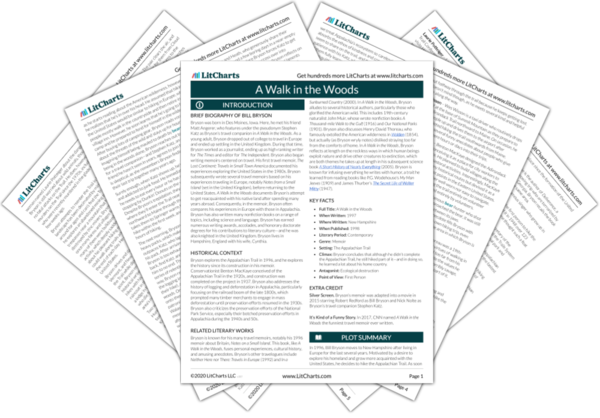Bill Bryson’s shifting attitude toward bears—from terror to sympathy—represents humanity’s misconceptions about the wilderness. From the start, Bill Bryson’s attempt to hike the Appalachian Trail is marred by his irrational fear of wild animals, notably bears. He devotes large portions of his account to describing all the terrible ways in which bears have killed humans, and he stays up for hours each night, terrified of being mauled by one. As the story progresses, however, it grows increasingly obvious to Bryson that animal attacks are extremely rare on the Trail. In contrast, human attacks—on the landscape, plants, animals, and other humans—are far more frequent. Similarly, most hikers who die in the attempt do so because of human ineptitude: they struggle with bad maps and get lost in the woods, or they make poor decisions like failing to carry the proper gear for bad weather. It’s only in the final few days of his trip that Bryson is able to direct his fear towards the actual threats he faces, rather than the perceived threats he imagines in his mind. Bears thus symbolize the irrational and somewhat misplaced fear of the wild (and its perceived dangers) that many human beings have.
Our fear of the wild often prompts us to do terrible things to other creatures, such as hunting those we perceive to be a threat. Most large mammals native to the Appalachian Trail—including bears—were, in fact, hunted to extinction or near extinction in the 20th century. Despite our misgivings about the threats that we face in the wilderness, we are actually the biggest dangers in the wild: we cut down trees, hunt wild animals, kill each other, and make silly mistakes that endanger our lives. Moreover, our fear of the wilderness often prompts our desire to conquer it, thus amplifying the threat we pose to other living creatures in nature. Bryson thus uses his shift in attitude about bears to imply that the wilderness would be a lot better off if human beings focused on changing our own behavior—rather than changing our environment to assuage our often-misplaced fear.
Bears Quotes in A Walk in the Woods
Through long winter nights in New Hampshire, while snow piled up outdoors and my wife slumbered peacefully beside me, I lay saucer-eyed in bed reading clinically precise accounts of people gnawed pulpy in their sleeping bags, plucked whimpering from trees, even noiselessly stalked (I didn't know this happened!) as they sauntered unawares down leafy paths or cooled their feet in mountain streams.
These are, in short, seriously inadequate maps. In normal circumstances, this is merely irksome. Now, in a blizzard, it seemed closer to negligence.
“Well you know what I’ve got in here, just in case? […] Toenail clippers—because you never know when danger might arise.”












